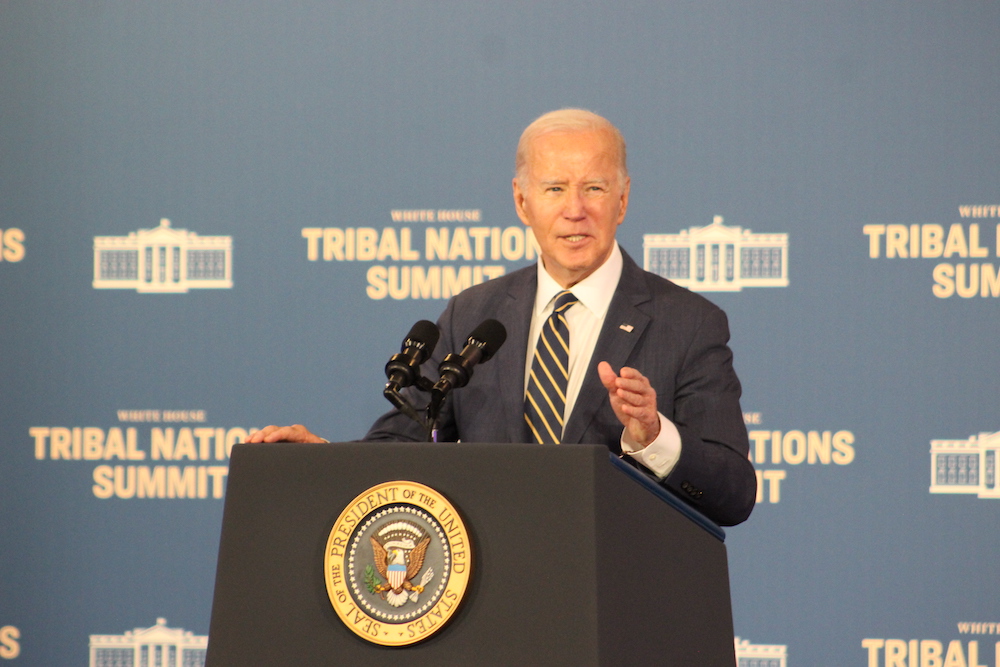
- Details
- By Brian Edwards
- Sovereignty
President Joe Biden hosted the third annual White House Tribal Nations Summit this week, emphasizing his administration's commitment to strengthening nation-to-nation relationships with tribes.
The gathering brought together tribal leaders and top administration officials to address critical issues facing tribal communities. On Wednesday, Dec. 6, Biden signed an executive order on reforming federal funding and support for tribal nations and aimed at promoting the next era of tribal self-determination and ensuring the federal government embraces its trust responsibilities.
The summit also showcased a range of federal programs and initiatives meant to address crucial issues faced by tribal nations. These included co-stewardship agreements for managing federal lands, training federal employees on tribal treaty rights, protecting sacred sites, streamlining critical federal processes, increasing accessibility of federal resources, and prioritizing the health, education, safety, and welfare of Native communities.
As part of the summit, several key initiatives impacting tribal economic development in Indian Country were announced including efforts to reform federal rules and processes for fee-to-trust land acquisitions and Indian homeownership.
The Department of the Interior (DOI) announced the publication of its final rule amending the process that governs the fee-to-trust lands process for tribal nations to transfer land title to the United States to hold in trust for the benefit of an individual Native citizen or a tribe, including in Alaska. The final rule creates a more efficient, less cumbersome, and less expensive fee-to-trust process, according to a White House briefing.
The Department of Housing and Urban Development (HUD) also announced plans to publish a final rule in 2024 to strengthen the Section 184 Indian Home Loan Guarantee Program, a program that has become synonymous with homeownership in Indian Country.
The Section 184 program has been controversial because only a small percentage of its lending has taken place on trust land, per prior Tribal Business News reporting. The vast majority of its loans have been for off-reservation property, though HUD maintains that a considerable amount of this lending is in border areas near reservations.
HUD’s proposed new rule aims to modernize the program and provide more homeownership opportunities in Indian Country by codifying program requirements, introducing greater certainty into the program to attract more lenders, and authorizing HUD to establish a minimum level of lending on trust land.
The summit also featured new programs and reporting on Biden administration efforts to increase access to federal resources for tribal nations.
On Wednesday, the DOI and White House Council on Native American Affairs (WHCNAA) announced it would launch a new website called the Access to Capital Clearinghouse. The site provides a searchable database of federal funding opportunities, including grants and loans that are available to tribal nations and Native businesses through federal agencies.
The DOI and WHCNAA also unveiled a draft Request for Information (RFI) that will, when finalized, help the federal government identify and estimate funding that tribal nations require to meet their communities’ needs. The RFI will allow tribes to identify barriers they face in accessing federal resources. The WHCNAA said it will take the draft directly to tribal consultation in January 2024.
The DOI and the Department of Health and Human Services (HHS), which oversees the Indian Health Service (IHS) also announced their progress on awarding contracts to Native-owned or Native-controlled businesses under the final rules of the Buy Indian Act.
The IHS announced it awarded $444 million to Native businesses, representing 30.6% of its total spending on contracts. HHS purchased a total of $1.5 billion from Native enterprises.
The DOI said it awarded more than $1.4 billion in contracts to Indian economic enterprises in fiscal 2023, up from $1.2 billion in fiscal 2022. The totals include a record high of $1.03 billion awarded to Indian small business economic enterprises in fiscal 2023, an increase of more than 8% over the prior fiscal year.
Last year, the DOI’s Bureau of Indian Affairs introduced new rules to make the Buy Indian Act work better. They launched the Buy Indian Act Information and Tools website, making it easier for staff and the public to get training, engage with stakeholders, and find info about Native American-owned businesses. The goal is to make it simple for people to identify and support Native American vendors when looking for contract opportunities under the Buy Indian initiative.
Assistant Secretary for Indian Affairs Bryan Newland emphasized that these actions show the Interior Department's dedication to Indian Country and align with the Biden administration's focus on helping small and disadvantaged businesses. He sees it as a crucial part of their mission to revitalize American Indian and Alaska Native Tribal communities by increasing economic opportunities.
Several other federal agencies announced economic development programs during the Tribal Nations Summit, including the Treasury, which announced an $86 million funding round for tribes under the State Small Business Credit Initiative, and the USDA, which unveiled the initial awardees under a $50 million grant program to help increase food sovereignty for tribes.
